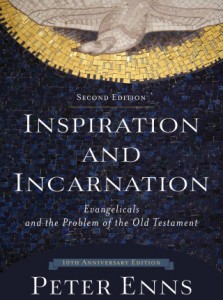I’m reading Inspiration and Incarnation: Evangelicals and the Problem of the Old Testament by Peter Enns as part of the Patheos Book Club. This is the second edition, recently re-released with a new afterword about the book’s reception ten years ago.
I chose this book because of “evangelicals” in the tag line–I spent a year in an evangelical church and still don’t really understand what attracts people who seem to be just like me to churches that I find it hard to spend time in. Evangelical pastors’ messages often not only surprise me, they terrify me. How can anyone truly believe that homosexuality is a sin in this day and age? As part of this community here on Patheos, I’ve found that many do.
To oversimplify, the “problem” of the Old Testament (or the Hebrew Bible) that Enns writes about is that it is a really, really old book. It contradicts itself–even within the same book, even between verses right next to each other–and it echos and repeats stories found in other ancient Near Eastern texts.
Anyone who has picked up the Bible for any length of time knows this.
What we choose to do with it, though, is largely determined by our political and religious affiliations. As a progressive Christian, I am tempted to dismiss the portions of the Bible that I disagree with–the parts, for example, where God tells Israel to enslave its neighbors. Evangelical Christians, on the other hand, find ways to work around the inconsistencies and confusing parts. They create complicated reasons we can ignore that particular verse, or interpret it in such a way that makes God consistent and omniscient.
What Enns points out, and what I find fascinating, is that we are both operating from the same assumption: God wouldn’t act like this in his own Bible.
Both the evangelicals who talk around inconsistencies and the progressive Christians who simply discount parts of (or the entire) Bible are essentially saying the same thing: this isn’t God’s real word, because God wouldn’t choose to say it this way. Evangelicals claim that God is saying something different from what he really means. Progressives are saying that God didn’t choose to write these words, because God simply wouldn’t do such a thing.
We both claim to have some prior understanding of God–in some ways a similar one. We both believe that God is somehow better than the Bible.
But what Enns argues is that God chose the Bible as the vehicle for his word, and that we should start from that vantage point and see what God tells us about himself.
I didn’t expect to be able to agree with a well-known evangelical thinker; I hadn’t yet. But I think Enns is onto something.
Part of me wishes I had read his book ten years ago. Ten years ago, I was 19, in college, looking for an alternative to Catholicism that would satisfy me spiritually and intellectually. I hung out with the evangelical Christians–my roommate attended their nondenominational services. I was even tempted to join a congregation that met in a movie theater (the same type that I’d immerse myself in a few years later). Evangelical Christians had a passion that I had not seen in any other church, and that I still rarely come across. Evangelicals, especially young ones like me, keep their faith in the face of seemingly impossible odds.
But Enns presents a way for everyone to understand the Bible without becoming disillusioned–though we will still remain confused. Enns argues that the Bible is akin to Jesus; he draws an analogy between Jesus’ human and divine nature and the Bible’s human and divine nature. Essentially, the Bible was written for humans, so it talks in terms that humans understand. But at the same time, it carries a divine message. We must understand both the ancient context and look for ways to reinterpret it ourselves so that it remains relevant.
Enns doesn’t decode the Bible, but he offers avenues into Biblical interpretation that I haven’t considered before. For example, rather than discounting the Proverbs, whose verses often state opposing things, we should see them as applying to different seasons of life. As Enns puts it, “we must let all of Scripture have its say.” So in some seasons, we should follow 26:4, “Do not answer a fool according to his folly.” In others, we should follow 26:5, “Answer a fool according to his folly.”
Over and over I found myself underlining passages where Enns’ words resonated; perhaps this passage says it best:
It is wholly incomprehensible to think that thousands of years ago God would have felt constrained to speak in a way that would be meaningful only to Westerners several thousand years later.
I have often compared the Bible to the Constitution and found it lacking; whereas the Constitution somehow remains applicable to my country’s problems more than two hundred years later, the Bible continually falls short in answering the questions about God that I have. But two hundred years is not so far away–and I am demanding much more from a document that arguably has its roots in stories from six thousand years ago, in a culture that is eons apart from the one I live in.
I am not ready to say that the Bible is God’s “inerrant” word, and Enns doesn’t argue that we should. But I’m pleased to have finally found a way to pursue the Bible as God’s word without throwing it down in disgust.













